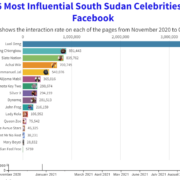Data Story: 90 Killed by a Strange Disease in Fangak County
By Deng Ghai Deng
Authorities in South Sudan’s Jonglei state are calling for urgent intervention as people and livestock die in alarming numbers after showing symptoms including diarrhea, vomiting, and general body weakness in Fangak County
Fangak County Commissioner Boutrus Biel says since early November, dozens of people – mostly children and the elderly – have died after experiencing symptoms including diarrhea, vomiting, and heart pain. Biel says about 90 people including 44 children, 27 elderly and 8 young people have so far died from the disease.
Table Showing Number of People Killed By the Strange Disease
| Category | Number of Deaths |
| Children | 44 |
| Adults | 08 |
| Elderly | 27 |
| Total | 90 |
“People are dying in Fangak County. There was sudden death and it started on the 2nd of October within the new Fangak town which is the headquarters of the county and also within the surrounding villages of Fangak County. Any time a person dies especially the children, the young ones and the elderly people. So far, we have lost 90 people, the record is that over 90 people have died. We are wondering whether it’s the impact of an oil explosion or something else.”
Table Showing Deaths and Recoveries
| Deaths | 90 |
| Recoveries | 30 |
| Total Infections | 120 |
Commissioner Biel says cattle, sheep and goats are also dying in the area. He says the area has been submerged in floodwaters for some time and local officials suspect the deaths could be linked to toxic water pollution caused by an oil spill.
“The cattle and goats have been dying because of water. You could see thing they are all grassing in water. Some people are taking their cattle to Malakal- the dry area- some are going to Pigi County in the site of cannel; some have gone across the river to Shuluk land and as far as Ruweng administrative areas. These are challenging times now for Fangak County, cattle are really dying and when there are no cattle it becomes difficult because that is the livelihood of the people.”
Commissioner Biel says he wrote to Jonglei state Governor Denay Jock Chagor about the deaths in Fangak, asking for an urgent intervention.
Responding to the calls, the Director-General of Preventive Health Services at the Ministry of Health, says a team of health professionals has already been organized and has been dispatched to the area.
“One important recommendation is to deploy a national response team to Fangak to investigate the reported increased morbidity and mortality in the area,” Dr. Romunu told reporters.
According to Dr. Joseph Francis Wamala, a Senior Epidemiologist at the W.H.O, the team will collect samples from the environment and those affected.
“There is actually a lack of a full range for all the other basic needs. So these teams will have the national response team and they will collect samples from those who are affected,” Dr. Wamala said.
Tuong Majok, the acting governor of Jonglei state says he notified national authorities about the situation in Fangak County after visiting the area with WHO and UNMISS officials.
“A team of World Health Organization, UNMISS and other agencies plus myself went to the location where the outbreak has taken place. It came to the surface of the water like oil and that’s why people are saying it is oil. We have reported this to the national government; the state has no experts. We reported it to the ministry of petroleum and the ministry of environment so that they can go to the location and see with their own eyes what the cause of this eruption is.” Majok said
Acting governor Majok says an investigation must be carried out immediately to avert a catastrophe. ASCOM is an oil and gas corporation from Moldova that operated in the area but left the country after the start of the conflict in December, 2013. Majok says an environmental impact assessment has not been conducted since the petroleum firm stopped operations in Fangak County more than seven years ago.
About the Authors:
Deng Ghai Deng, a Data Speaks Fellow at #defyhatenow South Sudan, wrote this data story, which was edited by 211 Check Editor Emmanuel Bida Thomas and approved for publication by Steve Topua, Data Analyst and Trainer. It’s part of the ongoing #defyhatenow South Sudan Data Speaks Fellowship program with funding from the European Union Delegation to South Sudan.
About South Sudan Data Speaks Fellowship:
This is a three-month data journalism fellowship for South Sudanese content creators with an aim of educating participants on the fundamentals of data journalism through in-depth training facilitated by experienced data analysts.
The fellows have been selected from across South Sudan and they are trained in data sourcing/mining, data analysis, and data visualisation for three months (October to December)
Each fellow will produce a minimum of three (03) data stories during the fellowship. The focus will be on increasing access to information



 211 Check Website Graphics
211 Check Website Graphics 




 211 Check
211 Check 211 Check
211 Check
Leave a Reply
Want to join the discussion?Feel free to contribute!